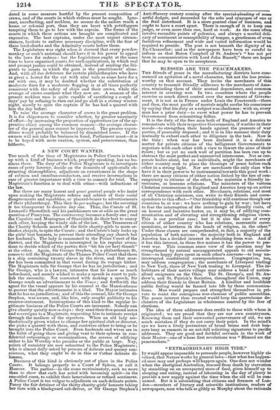CRIME ON THE HIGH SEAS.
" WHERE there is much smoke, there is some fire." The fre- quent stories of brutal abuse of power on the part of masters in the merchant sea-service, shows that neither acts of the Legisla- ture nor the efforts of private philanthropists have yet made our commercial marine exactly what it ought to be. If the stories told of the captain of the Tory at the Thames Po- lice-office are true, the only explanation of his conduct, consistent with respect for human nature, is that he was in a paroxysm of drunken delirium when he hacked and hewed his luckless crew in the way stated. The informations against this man are not completed when the mate of the Nunez is bound over to trial for °Toss cruelty exercised upon an orphan boy. The tale of the mutineers or pirates of the Saladin, executed some time ago at
Halifax, may yet live in the recollection of some of our readers. The atrocities .perpetrated in that ill-starred vessel appear to have had their origin in the reciprocal brutalities of two masters—one actually in command, and the other a passenger.
There is something in the constitution of our mercantile marine that favours the development of such atrocities. With the exception of the officers and two or three apprentices, the crew is generally composed of the first able-bodied seamen that offer. Without being positively worse than other classes on a par with them in circumstances and education, seamen are more difficult of control and management. Their feelings are blunted during long and frequent periods of isolation from general society. The range of their routine duties is narrow and monoton- ous, and ill qualified to develop their faculties. Long intervals of privation, alternating with brief intervals of unbounded indul- gence, impart a reckless tone to their character. Hardened to suf- fering, they are fearless of danger—wayward creatures of unrea- soning impulse. With such instruments the master has to work the ship, always in momentary apprehension, often under the im- mediate pressure of sudden and unforeseen danger. In a ship, there can with safety be but one will, one intelligence, to which all others are subordinate. The master of a ship lives in constant strife and struggle with his crew as well as with the elements. It would require a singularly happy temper not to break down at times under such a strain. When it is considered that this strain may continue without intermission for months at a time—that the physical health of him who suffers from it may be affected by protracted watches and exposure to the extremes of temperature —that, isolated from any companions with whom he may safely unbend, he may have sought solace in stimulants—it is not won- derful that crews and captains in vessels of the long voyage should often conspire to make the frail fabric that holds them a floating hell. Such cases, though of lamentably frequent occurrence, are not to be taken for the rule. The " A 1 " captains (to borrow a me- taphor from Lloyds') of our commercial navy, are an intelligent and estimable class. Much, too, has been done of late years, both by acts of the Legislature and by private individuals, to elevate the character of the profession. But much remains to be done. The almost paternal care which the Gladstones and other great shipowners bestow on their apprentices while on shore, and the liberal and discerning spirit with which they gradually ad. vance the more deserving to posts of higher and higher trust, has trained a fine body of officers. The late regulations, subjecting aspirants to the rank of masters or mates of merchantmen to cer- tain preliminary examinations, will go far to raise the general standard for officers in the Royal marine equally high. But even then, matters will be comparatively little mended till the improve- ment is made to penetrate into the mass of the crews. More skilful officers we are sure to have under the new regulations ; but while the crews continue to be made up of the waifs and strays of society as at present, there is no guarantee against the frequent recurrence of such melancholy aberrations of human passion as have given rise to these remarks. Certificates of ge- neral moral character are required from the examinants : but who can say of any man before he is tried, that, when invested with despotic power, remote from general observation, he can stand the terrible unintermitting strain upon the temper to which the mas- ter of any merchantman may be exposed ? Towards elevating the general character of the crews, Temper-
ance Societies have done a good deal. Houses for sailors ashore, to supersede the scoundrelly crimp system, is a plan that promises well. These, together with the greater attention paid to apprentices, are the experiments or suggestions of private individuals. The operation of the Legislature has been hitherto less successful. In seeking to deprive the master of some of his absolute power, the Legislature began at the wrong end. Despotism, for the time, is even more indispensable in ships than in the army. After re- sponsibility is the only applicable check. And even this is ren-
dered in some measure hurtful by the present composition of crews, and of the courts in which redress must be sought. Igno- rant, unreflecting, and reckless, no sooner do the sailors reach a home or colonial port, than they are beset with pettifoggers tempting them to go to law with the captain. The forms of the courts in which these actions are brought are complicated and expensive. The best captains, under the most urgent circum- stances, hesitate to enforce necessary discipline, with the fear of these land-sharks and the Admiralty courts before them. The Legislature was right when it decreed that every powder- monkey or cook's assistant should have it in his power to appeal to the laws for redress : but the Legislature ought at the same time to have organized courts for such applications, in which real and prompt justice could be obtained, instead of sending the liti- gants to courts in which the gain is the practitioners' alone. And, with all due deference for certain philanthropists who have as great a horror for the cat with nine tails as some have for a cat with one, it may be doubted whether the substitution of moderate fines for a moderate flogging is at all times perfectly consistent with the safety of ships and their crews, while the average of crews continue what they now are. A seaman of the present reckless race is quite capable of sacrificing a couple of days' pay by refusing to turn out and go aloft in a stormy winter- night, merely to spite the captain if he has had a quarrel with him the day before. To raise the average character of crews is the great problem. It is for shipowners to consider whether, by greater unanimity of effort—by increasing the proportion of apprentices (or of the ap- prentice class) among the common seamen—the average charac- ter of the general mass cannot be improved. The greater expen- diture would probably be balanced by diminished losses. If the owners will not take the business in hand, Parliament must—it is to be hoped with more caution, system, and perseverance, than hitherto.



























 Previous page
Previous page